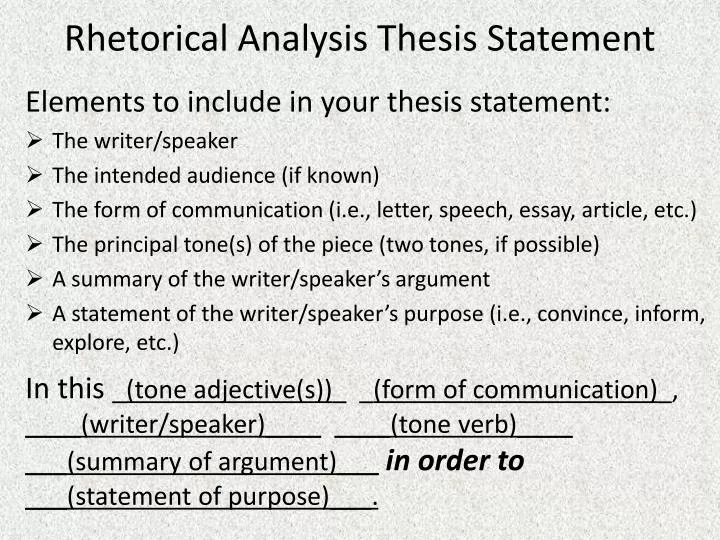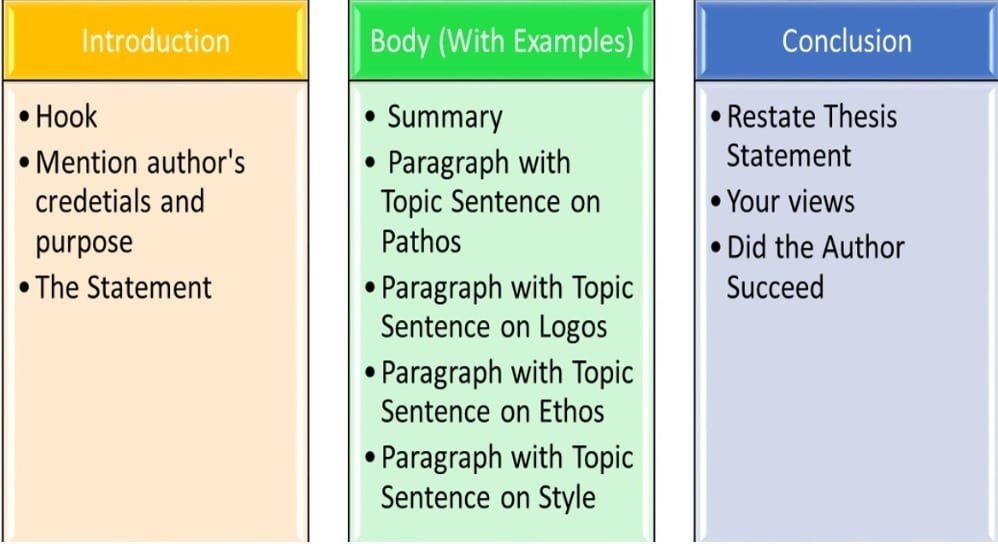
A rhetorical analysis is a process of describing and evaluating the words of a text and how they influence an audience. A rhetoric analysis explains and analyses how the text, the author, and an audience interact. When rhetorically analyzing a text you should incorporate the use of rhetorical principles to explore the argument in the text · The very definition of a rhetorical analysis implies that the person conducting the analysis call upon their critical thinking skills in order to dissect various elements of the work being analyzed. Essentially, this involves breaking the entire written work into sections and viewing each section blogger.comted Reading Time: 9 mins What a rhetorical analysis is: A rhetorical analysis is an examination of how a text persuades us of its point of view. It focuses on identifying and investigating the way a text communicates, what strategies it employs to connect to an audience, frame an issue, establish its stakes, make a particular claim, support it, and persuade the audience to accept the claim
Rhetorical Analysis | English Composition 1
We use cookies to give you the best experience possible. Commentaries, rhetorical analysis definition, documentaries, T.
shows, rhetorical analysis definition, famous art collections, even historical books. A rhetorical analysis can be written about many different mediums. The aim of a rhetorical analysis is to determine how a creator of the work analyzed came up with their argument. When you write a critical analysis essay, you may even wish to determine whether or not the original argument was successful or failed. The particular writing style used when authoring a rhetorical analysis varies slightly from that of a conventional essay, slightly more insight is required.
Continue reading for more rhetorical analysis definition on how to write a rhetorical analysis essay. Often times, writers and public speakers tend rhetorical analysis definition use linguistics to influence or engage with their audience. Occasionally, a writer will dissect works of non-fiction in order to determine how each piece of the original work fits together in order to convey a specific message or effect, this is called a rhetorical analysis or rhetorical analysis essay.
The writer might find that the original creator used certain verbiage or created specific imagery in order to entertain the audience, or to inform them, or perhaps to create a call-to-action. Nearly every medium can be the subject of a rhetorical analysis, including cartoons and political speeches. The purpose of authoring a rhetorical paper is not to oppose or agree with a particular side of the argument, rhetorical analysis definition, but rather to discuss how the rhetorician delivers their argument and if their approach is successful or not.
Used frequently in education, research, and even everyday life, an analysis is the act of segregating various elements of complex text with the intent of developing a stronger comprehension of the work as a whole.
The process of analyzing something means considering its real meaning, asking how it works or determining why it does what it does. Prior to delving into what a rhetorical analysis, it is rhetorical analysis definition to discuss and know what it is not, rhetorical analysis definition. A rhetorical analysis, while exploratory in nature, should not be confused with a research paper or article, and despite being consider a vehicle to explore literary works, it is not an example of a literary work itself.
The purpose of a rhetorical paper is not to try to know the underlying meaning of the work being analyzed, rhetorical analysis definition. The very definition of a rhetorical analysis implies that the person conducting the analysis call upon their critical thinking skills in order to dissect various elements of the work being analyzed.
Essentially, this rhetorical analysis definition breaking the entire written work into sections and viewing each section objectively. The primary objective of this type of analytical paper is to convey HOW the original author writes, rather than merely reflecting upon WHAT they wrote.
To do rhetorical analysis definition effectively, rhetorical analysis definition, the very important thing you should do is to analyze different strategies used by the writer in question in order to achieve their overall goal or determine the purpose of their writing.
Remember that writers from different backgrounds will often call upon different strategies in an attempt to meet their objective. Based on this understanding, it is acceptable to use different existing techniques of writing analysis to explore various works. Given that each of the original authors had very unique goals in mind, it is only logical that they would utilize different writing style.
Read also: What are the right words to start an essay? The first step learn how to start a rhetorical analysis paper is finding a good article or literary work that you would like to base your analysis on. As you read the text, attempt to identify the thesis or the main ideas and principal arguments that the author is endeavoring to convey. This involves re-reading the text, with the following questions in mind:.
The primary objective is to not only source for the answers to the questions presented above, but also to determine why exactly it is that the author has chosen to write in the style that they have written in. Remember, WHY not HOW. For example, when determining how the target audience is, consider why exactly the author would want to write for those specific individuals.
You can find out more on Chicago Annotated Bibliography. While there are many schools of thought on the best method to utilize while conducting a rhetorical analysis, at the top of the rhetorical strategy list is what is commonly referred to as the SOAPSTone method. Created as a method for breaking down the work of professional writers, the SOAPSTone method presents those writing an analysis with the information they need in order to develop rhetorical criticism.
An acronym, SOAPSTone stands for Speaking, Occasion, Audience, Purpose, Subject, rhetorical analysis definition, and Tone. By using this strategy, it is possible to refer to any text and construct a strong sense for what the original author intended and how their target audience may have reacted to it.
Also referred to as rhetorical rhetorical analysis definition, rhetorical strategies are used by writers in order to allow them to better structure or analyze paragraphs or entire essays.
Essentially, these types of strategies, or devices, rhetorical analysis definition, enable writers to utilize patterns to effectively express their thoughts and ideas. The most commonly taught rhetorical strategies are:.
Description: As most would agree, a great description has the potential to create strong images in the minds of the audience. An author might utilize an objective description, where they will describe the physical appearance of a character or location without any sort of emotion, rhetorical analysis definition, or they may utilize a subjective description, where the feelings of the writer are clearly evident based on the description.
A narrative will focus on the action of the plot, but will also include descriptions, themes, and ideas. Exemplification: Mankind learns by example, and when presented with written text, rhetorical analysis definition, it is the use of examples that allows us to learn at a much more rapid pace. Typically, and example is used to relate to a real world scenario regarding the argument or idea that the rhetorical analysis definition is attempting to deliver.
Cause and Effect: The term Cause rhetorical analysis definition Effect is just as it sounds, exploring the cause of a particular element or event and exploring the effect of that same element or event. Comparison and Contract: When comparing one or more things, you determine how they are similar. When contrasting one or more things, you determine how they are different. Typically, you would compare things that are different from each other to determine how they are related.
Moreover, you would contract things that are similar to each other to determine how they differ, rhetorical analysis definition. There are a few things that should be kept in mind when writing a thesis statement for a rhetorical analysis essay.
Detailed below is an easy to follow outline for an analytical paper. Remember that this is only a guide and can be customized rhetorical analysis definition needed. If you need some help or have certain difficulties you can always Pay Someone for Essay to get them done with little efforts.
The examples of rhetorical analysis essays can be found on the Internet. It is best to go through them to know the common writing patterns as well as the mistakes students often do, before you start preparing your own paper. By clicking "Log In", you agree to our terms of service and privacy policy. We'll occasionally send you account related and promo emails.
Diana from A Research Guide Don't know how to start your paper? Worry no more! Get professional writing assistance from our partner. Click to learn more. A Research Guide Writing Guide Essay Writing What is a Rhetorical Analysis Essay. Your e-mail goes here. Your Password goes here. Sign Up for your FREE account. Your password goes here.
What is a Rhetorical Analysis?
, time: 6:26How to Write a Rhetorical Analysis | Key Concepts & Examples

rhetorical analysis Rhetorical criticism is an approach to criticism that is at least as old as Plato. In the Phaedrus, Plato has Socrates examine a speech by Lysias to determine whether or not it is praiseworthy. definition (define) specify: determine the essential quality of The action or process of defining something An exact statement or · A rhetorical analysis is a type of essay that looks at a text in terms of rhetoric. This means it is less concerned with what the author is saying than with how they say it: their goals, techniques, and appeals to the blogger.comted Reading Time: 9 mins dissecting what a rhetorical analysis does ask you to do. Definition: A rhetorical analysis requires you to apply your critical reading skills in order to “break down” a text. In essence, you break off the “parts” from the “whole” of the piece you’re analyzing. The goal of a rhetorical analysis is to articulate HOW the author writes, rather than WHAT they actually wrote
No comments:
Post a Comment